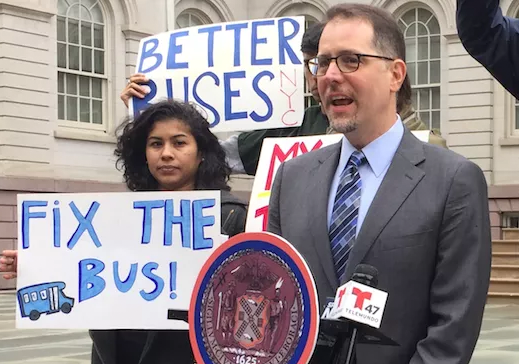Manhattan BP Looks To ‘Balance’ Community Boards By Asking if Applicants Own a Car

Wanted: fewer car owners.
New Manhattan Borough President Mark Levine is looking to ensure better “balance” on his borough’s 12 community board by adding a new question about vehicle ownership to the application to serve.
Along with other questions — such as whether would-be board members are homeowners or renters, if they’re business owners, and demographic questions about race and sexual orientation — potential Manhattan panelists will be asked a yes or no query: “Do you own a vehicle?”
Pleased to report that the Manhattan Borough President now asks community board applicants, “Do you own a vehicle?” Great way to diversify boards in a borough where only 22% of households own a car.
I’d encourage anyone to apply: https://t.co/JiIZn5eriG
Bravo @MarkLevineNYC! pic.twitter.com/FEmxppm2tC
— Billy Freeland ????? (@BillyFreelandNY) January 11, 2022
According to Levine, it’s part of a process to bring better discussions and clearer data to the boards.
“It’s important that community boards reflect the diversity of perspectives of their communities,” he said. “It’s important that we have a balanced perspective on how people get around. This is a borough with a very low rate of car ownership, significantly below the city average, and lowest of the five boroughs. I want every perspective represented, but I want a balance that reflects Manhattan and Manhattanites.

American Community Survey data from 2015 to 2019 shows that a whopping 77 percent of homes in Manhattan do not have a vehicle available. Despite that overwhelming car-free majority, Levine noted that there was no data showing whether that aspect of Manhattan’s population was remotely reflected on the community board level. Besides turning the question of whether car owners are overrepresented on the boards into a guessing game, Levine said that that overrepresentation can warp the discussion of transportation issues at the board level.
“I am pretty sure that there are boards in Manhattan where the rate of car ownership [on the board] is a substantial majority, even triple of the rate of car ownership than [the neighborhood] in some cases. And that just changes the tone of the discussion on all variety of issues related to transportation and street use. So adding this question will give us first information to track this and will hopefully make it easier to ensure we have all perspectives represented,” he said.
Levine said that he remembered community board debates around car share pilots as one where he thought the voices of people without cars were underrepresented. There have also been the occasional bike lane fights that go to absurd lengths even in Manhattan, like last spring’s multiple meetings over whether to install protected bike lanes on East 61st and East 62nd streets that turned into hours-long gripe sessions from anti-cycling board members. While the new question won’t make boards totally free of this kind of conflict, explicitly understanding how many people on a community board do and don’t own cars should at least make sure the perspectives are heard from.
Demographic profiles that borough presidents have published about community boards have never included how many members of each community board own cars. The reason for that probably comes down to the fact that mobility questions were not part of the application process until Queens Borough President Donovan Richards began asking applicants about it last year. The mobility question is part of a larger community board reform effort that Richards rolled out upon taking office. The process hasn’t always done the job of keeping the most reactionary voices off of community boards, but Richards’s office did say that of the 110 new community board members he appointed in 2021, 75 use the train, 54 use the bus and 23 use a bike or scooter to get around.
One Queens community board veteran said that in his opinion, the new questions Donovan is asking board applicants is having a positive impact on business at the boards.
“The new questionnaire, which asks a bunch of other questions to help identify a more diverse group of people to appoint, has made a difference,” said Peter Beadle, a member of Queens Community Board 6. “As did placing it online and making it much more accessible. The average age of appointees appears to be more in line with the community as a whole, and the people appointed are more diverse in terms of background, experience and ethnicity. And overall our Board has been more open to some new approaches to street design, bike facilities and other ideas.”
Levine, who will get to appoint 600 community board members in 2022, will need the voices of people who care about more than parking to get pieces of his agenda done, like converting half of the e-commerce deliveries done in Manhattan to cargo bike deliveries or pedestrianize pieces of Broadway. But the beep also says the application question is not about insidious agendas to keep car owners off of Manhattan community boards and more about making them work better.
“We want everyone’s perspective represented including car owners, of which I am myself one. Community board applications are very long and have a wide variety of questions, and there is no secret agenda behind any of them. We’re not looking to exclude renters or homeowners because we ask about your housing type, but it would be inappropriate if we had a dramatic underrepresentation of either renters or homeowners. Having that question on the board application ensures that we have that balance. We want that kind of balance for car ownership as well,” he said.





